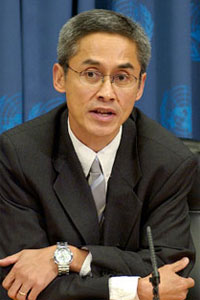
This year marks the 70th anniversary of the Universal Declaration of Human Rights, a seminal declaration adopted by the UN General Assembly in 1948. This document has spawned several international treaties ("conventions") and it has inspired a vast range of actions worldwide to protect human rights on the basis of equality and non-discrimination.
Yet the situation in the Asian region is perplexing, if not distressing, on several fronts. Add to that the riddle: how, and how much, has the Asian region contributed to the formulation and implementation of the declaration?
The declaration helped give content to human rights by charting, in a concise document of 30 articles, those rights which are universal and inherent in all of humanity, ranging from civil and political rights, such as the right to life and right to freedom of expression, to economic, social and cultural rights, such as the right to an adequate standard of living and right to education. Then and now, it acts as an all-embracing framework of basic minimum benchmarks for all countries.
The drafting of the declaration was led by a nine member committee headed by Eleanor Roosevelt, and there were two Asians on board: Penchun Chang (Chinese) and Charles Malik (Lebanese). The former member is credited for laying down a step by step approach, starting with the non-binding Declaration to be followed later by binding treaties and implementation measures, with the package now known as the International Bill of Human Rights. He also balanced the emphasis on individual rights derived from some Western countries with influences from the East, particularly Confucian thinking. Not only issues of law but also ethics were raised and these were incorporated into the Declaration via references to "morality" and "conscience".
The latter member of the committee evoked Middle eastern philosophy, while highlighting also civil and political rights interlinked with personal liberties, such as freedom of thought, conscience and religion. He noted the relationship between the individual and the family and was an intermediary in securing the secular and non-deistic underpinnings based on nature and reason as part of the universal project.
Along the way to adoption of the Declaration by the UN General Assembly, representatives from various Asian countries provided key contributions. There were inputs from representatives of India and Pakistan who called for more emphasis on women's rights and this had an impact on cementing the right to marry and the right to have a family.
Twelve Asian countries, namely Afghanistan, Burma (later Myanmar), China, India, Iraq, Iran, Lebanon, Pakistan, the Philippines, Syria, Turkey and Siam (later Thailand), voted in favour to adopt the declaration, while only one country (Saudi Arabia) abstained. Altogether forty eight countries voted for the declaration. There was no dissenting vote, although there were eight abstentions.
Of course, the declaration has to be viewed through the evolving lens and dynamics of time. There has been much progress in some settings which would justify its celebration. Today, there is a range of human rights treaties with international human rights bodies monitoring their implementation. All Asian countries are parties to the Convention on the Rights of the Child and all countries have engaged with the UN Human Rights' Universal Periodic Review system which acts as peer review of implementation at the national level.
While the region does not have an inter-governmental human rights system, several parts of the region ranging from Southeast Asia to South Asia and West Asia have undertaken various initiatives on human rights (admittedly more linked with human rights promotion rather than human rights protection and at times, sub-standard in content and in practice).
These include various human rights mechanisms (for instance, the Asean intergovernmental Commission on human rights) and instruments (such as the Arab Charter on human Rights, various South Asian treaties on human trafficking and on child welfare arrangements, and Asean Human Rights Declaration).
There is also now a large number of national human rights commissions.
Yet there has been regression in parts of the region, particularly with impediments facing civil and political rights and the shrinking space of civil society. Undemocratic regimes predominate in various countries. Some still voice particularities, such as "Asian values", which they claim should prevail over international standards. This plays into the hands of those who wish to limit the rights of individuals, particularly the right to freedom of expression and peaceful assembly, in the face of the omnipotent state.
This is compounded by overly broad notions of national security and public morals/morality which are instrumentalised to curb dissidence in the name of the collective interest.
Armed conflict and violence, including gender-based violence, wreak havoc in parts of the Asian region. The Syrian war is catastrophic for the millions who are displaced internally and externally, and it is a sad testament to the international meddling by external actors, on the one hand, and the proliferation of non-State armed groups and terrorists, on the other hand. Yemen, Myanmar, Iraq, Afghanistan, and North Korea remain flashpoints of great intricacy.
It is also increasingly realised that the human rights entry point is inadequate if it neglects the nexus with the environment and sustainable development. With climate change, there will be more disasters facing this region, consequentially with huge displacements and disruption. While there has been great buy-in among Asian countries in their acceptance of the UN's Sustainable Development Goals 2015-30 as a complement to human rights, and while there has been progress on tackling poverty, recent UN related data show inequitable development, with mounting inequalities. Add to that the new challenges posed by technology and robotics, such as cyber crimes and self-automated killing machines.
The passage of 70 years is thus a time to be humble and an invitation also to commemorate. The challenge is to deal with peace, democracy, accountable governance, and sustainable development, so there is no implementation gap. The onward journey is thus to re-energise with new partnerships, including more South-South cooperation, with more space for civil society, enhanced by enlightened leadership and embracing people's empowerment.
